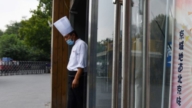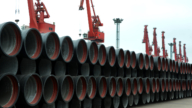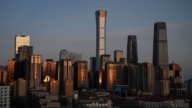【新唐人2013年06月29日讯】在央行6月25号发布的一份安抚声明,驱散投资者对于中国银行同业借贷市场流动性缺乏的担忧之后,中国股市停止了暴跌,中国银行同业拆息从超过20%下降到大约6%。但是,许多问题仍然存在,包括什么是这场金融动荡的原因?央行打压地下银行的做法将给疲软的经济雪上加霜吗?
对于是什么原因造成最近中国银行同业拆借市场的紧张,有许多人猜测是央行故意设计了一场人为的信贷紧缩,以打击中国地下银行领域,遏制中国信贷泡沫的膨胀。但是美国《财富》杂志6月27号发表美国政治学家裴敏欣的评论认为,这场金融动荡并非央行有意设计,而是一个长期形成的问题突然爆发,而中共货币部门对此手足无措。
“北京大学”经济学教授夏业良也认同这种观点。
北京大学经济学教授夏业良:“这个虽然讲(央行)有让银行各负其责的这样一个压力,但实际上并不是说央行一开始设计好让它们往里面钻的。而是到了目前这个地步以后,央行现在一方面它要嘛就是救,救这个商业银行,实际上它也救不了,它要巨额的天文般的数字才能救。另一方面它就是要求各负其责,要银行自己承担这样一个风险。我觉得这样做是对的。”
夏业良指出,这场资金紧缩的爆发,一个是银行体系本身放贷过多,银行本身也缺乏足够的约束,所以资本金准备也不充分,造成现金流动性虚弱。如果遇到大规模提款的话,它就没有办法应付。
夏业良:“其实这个钱都到哪儿去了?都是铺摊子去了。搞那些几万亿的工程,面子工程,各行各业都在大兴土木搞建设。那钱暂时收不回来,有的项目本身就是失败的项目,所以钱就没有办法收回来。现在同行之间互相拆借资金,谁拿到现金就觉得可以让企业活起来,或者让银行自身保持地位不变,所以拆借利率可以达到百分之十几,甚至百分之二十,这简直是一种非理性的自杀行为,对银行来说。”
夏业良指出,中国经济现在积聚各种风险,有很多长期以来没有解决的结构性矛盾和问题,到一定时点上都会爆发出来。
夏业良:“比如通货膨胀问题,比如说因为人民币升值造成倒逼货币超量发行,这样一些问题,包括最近的钱荒,都是金融体系缺乏系统性的制度约束所造成的。现在很难说金融危机在什么时点上爆发。反正现在有很多的危机,包括房地产泡沫,还有对外贸易方面,出口本来就是减少,另一方面银行本身,本来是想通过上市以后实现现代公司企业治理制度能够得到提升,但是现在来看,只是有了这个形式,有了外部这个壳,但是内涵还是没有。这里边就存在很大隐患和风险。”
北京“天则经济研究所”副所长冯兴元认为,地下银行本身之所以在中国蓬勃发展,是市场对政府管制的反抗。如果政府单纯打击地下银行,而不是进行结构改革,中国经济将会受到打击。
北京天则经济研究所副所长冯兴元:“你可以看到整个政策还是行政调控,这样的话,市场主体包括银行,它肯定要转向表(资产负债表)外业务向需求主体提供融资。包括社会上的资金也需要出路。这样的话,像信托,银行界的债券市场,银行间拆借,是非常活跃。它是一种市场对政府管制的自然反应。所以如果它还要打压影子银行的话,那实际上整个经济就被他打压了。”
《纽约时报》6月27号评论说,即使中共领导人习近平能够成功的推动这些相当艰钜的经济改革措施,中国的经济增长,可能也会比普遍预期慢。
采访编辑/秦雪 后制/周天
Political Factors Overshadow China’s recent Financial Turmoil
A Fortune article wrote that, Chinese stock markets halted
their plunge on 25th June after China’s central bank issued
a reassuring statement to dispel investors’ worries
about the lack of liquidity in China’s interbank loan markets.
The rates of China’s interbank loans also fell from
over 20% to around 6%.
However, many questioned remain to be answered.
What are the causes of this financial turmoil?
Will the crackdown on shadow banks make
China’s economy even worse?
There are many theories about the recent seizing-up of
China’s interbank loan market.
Many speculate that China’s central bank have engineered
an artificial credit squeeze to crack down on China’s shadow
banking sector, such as to prevent the bursting of
the credit bubble.
However, American political scientists Minxin Pei published
an analysis article in Fortune magazine on 27th June which
presents another theory.
Pei believes that, rather than being plotted by China’s
central bank, the incident is most likely a botched response
by the Chinese monetary authorities to a problem that
has been long been in the making but exploded without
warning and caught them completely by surprise.
Xia Yeliang, a professor of economics at Peking University,
agrees with Pei’s theory.
Xia Yeliang, professor of economics at Peking University:
“Although the central bank now pressures the banks by
making them responsible for their own business,
this was not artificially plotted from the very beginning.
The central bank simply requires all the banks to take
their own risks as the situation has become so bad.
I think this is the right move.”
Xia Yeliang remarked that, one of the causes of
the credit squeeze was over-lending by the bank system.
As the bank industry is not well regulated in China,
it didn’t stock enough capitals to support the
lending magnitude and thus resulted in a weak cash flow.
Therefore the banks will fail to respond if a large scale
of cash withdrawals were requested.
Xia Yeliang: “Where has the money gone?
It was used to put up rash establishments, such as image
projects that may cost as much as a trillion Yuan.
Almost every industry is doing the same thing.
As many projects have failed, the banks cannot
get the money back.
Now the banks are borrowing money from each other.
They feel that the cash can vitalize the business which is
necessary to keep their reputation, and the lending rate
has increased to over 10% or even 20%.
For banks this is definitely a crazy move
that results in their killing themselves.”
Xia Yeliang said, many risks have been stored in
China’s economy; there are many structural problems
that have not been solved for a long time;
all of these will break out at a certain time.
Xia Yeliang: “There is an inflation problem.
There is also excess monetary growth forced
by RMB appreciation.
Recently there has been a cash flow problem.
All this results from the lack of systematic regulations
of the bank system.
Currently it is still hard to tell when
the financial crisis will break out.
But we know there are many of them, such as the real
estate bubble and the dropping of foreign trade.
Talking about Chinese banks, they have been expected
to adopt modern management systems after coming onto the market.
But now we see that the changes are only superficial and
not completely structural.
There is really a hidden danger and big risks behind this.”
Feng Xingyuan, vice director of Beijing Tianze Research
Institution of Economics,
said the prosperity of shadow banks itself is a
resistance to the party’s administrative control.
If the authority simply suppresses shadow banks
without making any structural reform, China’s economy will be greatly damaged.
Feng Xingyuan: “You can see that the party’s policy is still
largely some kind of administrative control.
Therefore the majority of the market, including the banks,
will inevitably provide loans to off-balance sheet business.
The situation is similar for free money in society.
This leads to prosperity of a trust company,
interbank bond markets and loans.
This is the natural market response
to the administrative control.
Therefore if the authority insists on cracking-down on shadow
banks, it will in fact suppress the whole economy.”
A New York Times article on 27th June wrote that,
Even if Mr Xi succeeds in pushing through ambitious
economic reform packages, as we should assume he will,
growth in China is likely to be slower than
the consensus of expectations.




























